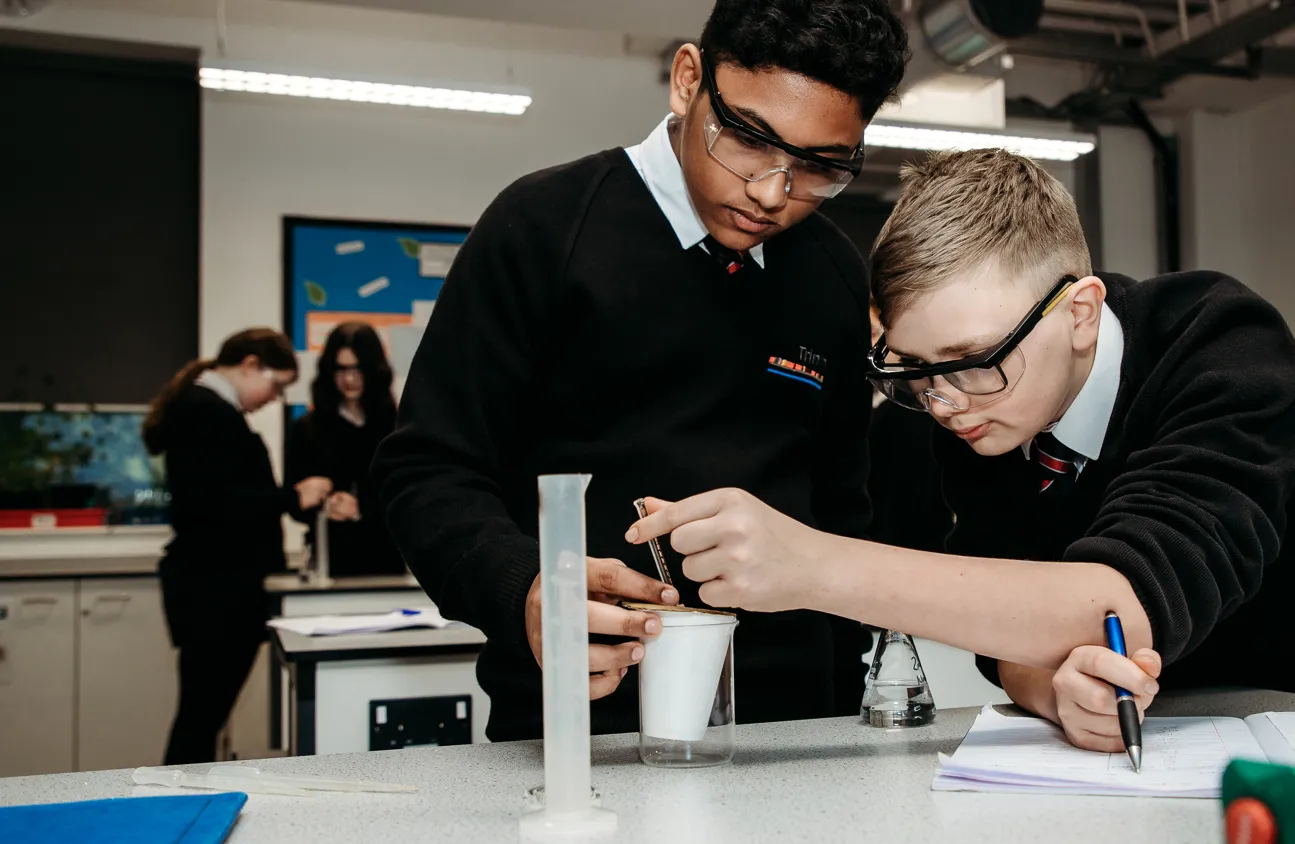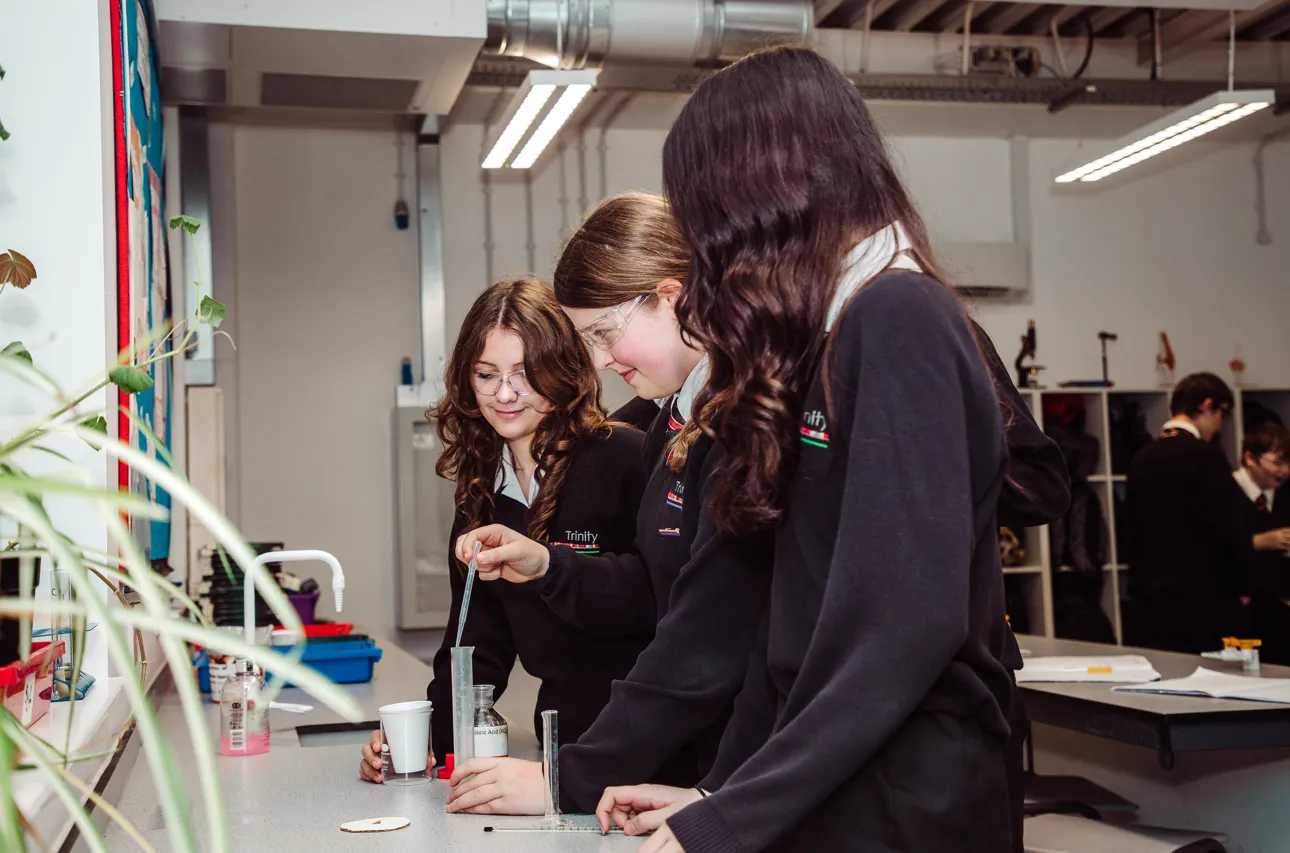01635 510500
Students in Year 7 and 8 study the three topics in Science – Biology, Chemistry and Physics on a rotation basis.
Students in Year 7 cover the following topics:
Introduction to Science: Science safety and skills
B1 - Where do I come from? Cells, reproduction, inheritance
B2 - Preventing Extinction: Adaptations, interdependence, global warming
C1 – What is everything made of? Elements, compounds, mixtures, separation techniques
C2 – Categorising Chemicals: Properties, reactivity, pH
P1 – Energy in my house: Energy stores, insulation, electricity generation
P2 – In space can anyone hear you scream? Solar system, light, sound
Students in Year 8 cover the following topics:
B3 – How can I keep my body healthy? Healthy diet, pathogens, drugs, respiration
B4 – Where does my food come from? Photosynthesis, selective breeding, food production
C3 – Chemicals in the home: Neutralisation, enzymes, endothermic and exothermic reactions
C4 – Earth Chemistry: Structure of the Earth, using resources, pollution
P3 – The Physics of Sport: Forces, speed calculations, aerodynamics
P4 – How does my mobile phone work? Electrical circuits, static electricity, coloured light
Science in year 7 and 8 at Trinity School is split into Biology, Chemistry and Physics topics. We have chosen topics and content for our KS3 students that helps them build upon the scientific thinking that they will have started to develop at primary school and will lead them to build a solid foundation of understanding that will support their subsequent GCSE Science studies. Our topics make direct links to the lives of the students; for example, they will study the importance of vaccinations, the electrical circuits which enable their phones to work, and the chemical reactions which cook their food and clean their clothes. Additionally, in order to help our students grow up to live responsibly and sustainably, we have ensured that they cover important issues such as climate change, food production, electricity generation and environmental pollution.
The majority of lessons will have a practical component to them. These hands on elements help students to understand the complex science which they are learning about. They will also develop their investigative skills in a series of mini projects. Students will practice skills such as designing methods that allow them to gather accurate and valid results, analysing and graphing data in order to spot trends, as well as considering how the results of their work can be applied to real life scenarios.
As well as a mini project, each topic will have an end of topic test which will assess students’ knowledge and understanding of the content covered. These tests include a range of question styles including multiple choice, short and medium length written questions and a variety of maths based questions assessing, for example, graph skills and the use of equations. Students will receive a grade based on their score in these assessments.
We understand that Science is a very recall heavy subject with a whole new dictionary of key terms for students to learn. In order to help students retain what they have studied, they will revisit previous topics throughout the year in the form of interleaving lessons. Students will complete quizzes to see what they’re remembered and then use lesson time to fill any gaps which may have appeared.
At Key Stage 4 all students follow the GCCE in Science. Every student will learn topics from Biology, Chemistry and Physics. The different topics are:
Biology
Cell structure
Diseases and the immune system
Photosynthesis and respiration
Nervous system, hormones and homeostasis
Evolution and genetics
Ecosystems
Chemistry
Atomic structure and The Periodic Table
Bonding
Chemical changes
Electrolysis
Organic reactions
Polymers
Our atmosphere
Earth's resources
Physics
Forces and motion
Energy
Waves
Electrical circuits
Magnetism
Radioactivity
Space physics
GCSE Science
In GCSE, we follow the AQA Trilogy Science specification. We offer Combined Science and Triple Science for our most able learners.
The AQA Trilogy specification is divided into two components: Paper 1 and Paper 2. We begin in Year 9 with Paper 1 content as this encompasses the core scientific ideas that students need to understand before moving on to more complex topics of study.
At the start of each new topic and where applicable throughout topics, we revisit material from KS3. We make explicit links between KS3 and new KS4 knowledge to challenge misconceptions and assist students in strengthening their understanding of the material.
Each topic is assessed with an end of topic test. These are differentiated for Combined and Triple Science routes. These are teacher-marked and allow teachers to assess if students have understood whole topics of study. In follow up lessons, students will highlight areas of strength and weaknesses and keep a record of these in personal folders. Teachers will address any common misconceptions through whole-class feedback.
As closely as possible, our topic test outcomes are based on the grade boundaries from the most recent set of examinations. Being able to assess students on whole papers (i.e. all of Paper 1 or Paper 2), allows us to use the exact mark schemes and grade boundaries. Therefore providing students with the most accurate grades possible based on their performance.
We want our learners to continue to build on the practical skills that they have acquired in KS3 and thus whenever possible, lessons are based around these hands-on activities. Practical lessons are memorable for students and help them to understand more complex phenomena in a tangible way.


In KS5, we offer Biology, Chemistry and Physics A levels. Each of these courses follows a different specification. For Biology; it’s EdExcel Biology B. The OCR Salters scheme is followed for Chemistry and AQA for Physics.
Teaching and learning in KS5 follows the same guiding principles as the teaching that takes place in KS3 and 4 lessons. This includes beginning lessons with low stakes testing of previous learning and giving students opportunities to develop their skills through practical work. However, there are some key differences.
In KS5, there is a much greater emphasis on independence. For example, students need to think through how best to carry out a practical, given basic instructions. Additionally, students are often required to complete preparatory work ahead of a particular lesson.
In a similar fashion to GCSE, A level students complete a series of core practicals which link to the various topics of study. What sets A level apart is the expectation that the practicals are completed independently and without teacher intervention. It is often the case that a full hour is utilised in setting up equipment, manipulating variables and recording data. Students are also expected to write up their findings in lab reports for homework.
The exam papers across Biology, Chemistry and Physics may include multiple-choice, short open, open-response, calculations, extended writing questions and mathematical questions. Each paper will also include questions that target understanding of experimental methods.
Although practical work is important, students are frequently guided through “thought experiments”. This is particularly useful for abstract ideas such as quantum theory.
A level classes tend to have smaller numbers of pupils. This means there can be a very collaborative, inclusive feel to lessons and the teacher gets to know every students really well – and vice versa.
Biology
Biology is composed of 10 topics. These are:
Topic 1 - Biological Molecules
Topic 2 - Cells, Viruses and Reproduction of Living Things
Topic 3 - Classification and Biodiversity
Topic 4 - Exchange and Transport
Topic 5 - Energy for Biological Processes
Topic 6 - Microbiology and Pathogens
Topic 7 - Modern Genetics.
Topic 8 - Origins of Genetic Variation
Topic 9 - Control Systems
Topic 10 - Ecosystems
Chemistry
In the first year of the course, students will study the units of ‘Elements of Life’, ‘Developing Fuels’, ‘Elements from the Sea’, ‘The Ozone Story’ and ‘What’s in a medicine’.
In the second year of the course, students will build upon the foundations gained in year 12, and they will study 5 further units – ‘The Chemical Industry’, ‘Polymers and Life’, ‘Oceans’, ‘Developing Metals’ and ‘Colour By Design’.
Physics
At AS, students cover topics on particles and radiation, quantum phenomena, waves and optics, materials, electricity and mechanics. Students will learn about and discuss the inner-most workings of the atom, the story behind quarks and antimatter, and the idea of waves behaving as particles. The properties of waves and the diffraction, refraction and interference of light are studied. The behaviours of electric circuits and materials are investigated. In mechanics, students learn about the laws of forces and motion.
For A level, learners will build on AS work and study thermal physics and gases, nuclear physics, further mechanics, and gravitational, electric and magnetic fields.
Topics include: circular motion, vibration resonance, capacitors, electromagnetic induction and nuclear energy. In addition, a popular option choice is Astrophysics, covering telescopes, the life-cycle of stars and the origin of the universe!